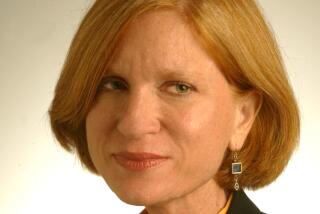‘SCHOOL’ OF NOTE TRAINS ROCK STARS
- Share via
SAN DIEGO — Classes meet only at night.
The classrooms themselves move around a lot, from nightclub to nightclub.
So do the teachers: mostly local rock ‘n’ roll bands who ignore whatever is on the current Top 40 in favor of music they write.
And the students at the San Diego School of Rock ‘n’ Roll are, for the most part, out-of-towners who move away after they graduate because they realize that employment opportunities are usually better someplace else.
The alumni roster is impressive: Rosie and the Originals. Gary Puckett and the Union Gap. Iron Butterfly. Stephen Bishop. Michael Franks. Jack Tempchin. Ratt.
And now, Jef Scott. Class of ’79.
The 28-year-old Scott got his musical education in the late 1970s while he lived for three years in San Diego, which he refers to as his adopted hometown.
He attended classes at the Skeleton and Zebra clubs downtown and the Spirit in Bay Park. His teachers included such local stars as DFX2, the Penetrators and the Rick Elias Band.
He watched and listened and occasionally played, but mostly he just hung out. And when he earned his pop diploma in 1979 and moved to Los Angeles--the Silicon Valley of the music industry--he took with him everything he had learned: a flair for catchy melodies, a thorough understanding of rhythm and a fluid dexterity on the guitar.
Seven years later, Scott is finally near the top of his field. His debut record album, “Ten Stories,” was released a few months ago by Epic Records. One of his songs--the dramatic “One by One”--is getting more and more play on by album-oriented rock radio stations across the country.
Like most of his fellow graduates, Scott comes back to San Diego from time to time. His visits--mostly conciding with concert appearances--are testaments to the value of the education he received here.
“For so many of us, San Diego is where we got our act together before coming up to Los Angeles to impress,” said Scott, who performs tonight at the KGB Halloween Ball at the Del Mar Fairgrounds.
“There’s a lot of great talent in San Diego, and there’s no question that you can learn a lot just by going to the clubs and listening to local bands.
“But the fact is, there aren’t very many record company people willing to fly down to San Diego, so eventually you have to come up here, where they are.”
Shortly after he moved north in 1979, Scott met Tony Kaye, the original keyboardist with progressive rock heavyweight Yes.
At the time, Kaye was playing with a hard-rock band called Geisha. At Kaye’s request, Scott was brought on board, and for the next year he toured the country, opening shows for Cheap Trick, Molly Hatchet and Jimmy Buffett.
A year later, Geisha broke up. Scott briefly joined Badfinger during the landmark British band’s abortive comeback, but at Kaye’s urging he soon retired from the road to concentrate on his songwriting.
“Originally, I supported myself writing TV theme music for Lorimar Productions, but after a while, that got boring, and I decided to devote all my time to writing songs,” Scott said.
“In 1981, I went to Israel to write songs for the movie ‘Paradise,’ starring Phoebe Cates and Willie Aames. When I got back, Tony wasn’t doing anything, and he ended up putting me in the studio.”
For the next two years, Scott and his mentor wrote and recorded hundreds of songs in the hopes of landing a recording contract on their own.
“But no one was interested,” Scott said. “Looking back, we were doing the sort of stuff bands like INXS are doing today, and I guess we were just ahead of our time.”
In 1984, Kaye rejoined Yes and Scott was left on his own. He spent more time in the studio, and at last attracted the interest of Epic Records, which signed him to a record deal as a solo artist.
Scott said it took two years to finish his first album. And now that it’s out, he’s finding acceptance not from the new wave circles he originally considered himself part of but from critics and radio stations that compare him to more traditional rockers such as John Cougar Mellencamp, Bryan Adams and Bruce Springsteen.
“Even though I admire those people, I don’t try to emulate them,” Scott said. “I like to think of myself as a bit more modern than that.
“The bands I grew up on in San Diego, like DFX2, had a lot of good new ideas that I’ve since incorporated into my own style of writing, playing and singing.
“So instead of grass-rooting it, I want to be considered a part of the wave of the future.”
More to Read
The biggest entertainment stories
Get our big stories about Hollywood, film, television, music, arts, culture and more right in your inbox as soon as they publish.
You may occasionally receive promotional content from the Los Angeles Times.










